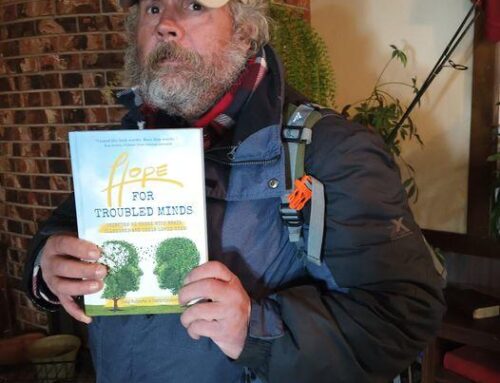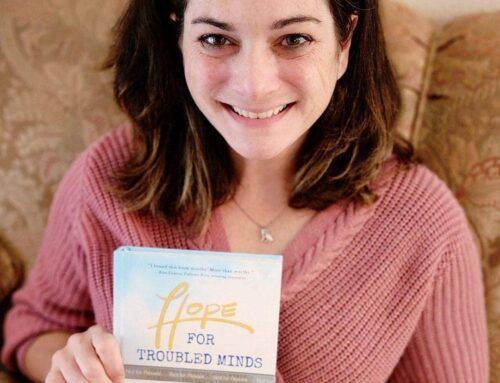Some months ago, I’ve became rather obsessed about anxiety. In “Moving Anxiety to Motivation,” I explored how God’s words “Don’t be anxious about anything…” (Philippians 4.6) indicate more God’s loving reassurance than God’s wrathful scolding. Certainly, God wants us to be anxiety-free, but He knows the best way to reach this goal is not to scare anxiety out of us, but instead to be Present with us, neither taking pity on our predicament nor trying to cheer us up with false platitudes.
One month about a year ago, I only left my basement apartment four times. For worship, and to pray with a brother in Christ. My hermitage existence hit me as I was putting clean clothes away. PJs. Underwear. Socks. That’s it. Friends asked me what I do as I lie in bed all day. Mostly, it’s less about what I do than what I avoid. I sleep. I’ve developed a knack for tuning out the anxious voices within and around me by numbing myself into a thoughtless state. Maybe this is the opposite of mindfulness. I don’t know. But this is what I do. And when I can’t sleep, I am bombarded by thoughts and images of things I’ve done wrong and the wrong I will do if I got out of bed.
“What does your anxiety do? It does not empty tomorrow of its sorrow, but it empties today of its strength. It does not make you escape the evil; it makes you unfit to cope with it if it comes.” ― Raymond L. Cramer, Psychology of Jesus & Mental Health
Anxiety is not unique to mental illness, but many persons with mental illness have a disproportionate share of it. For some, pills can take the edge off it. For others, it seems the pills numb our sensations such that we lose our capacity to fully feel. Some measure of anxiety is essential. The world is a scary place. We are right to have some amount of fear. It’s only when our anxiety becomes crippling that we can fully benefit from anti-anxiety meds.
It’s easy for me to say, of course. Anxiety is not my primary diagnosis. I’ve only suffered from panic attacks maybe a couple dozen times in my life. I have the luxury of avoiding most stressful situations and hiding out in my basement apartment. Maybe I’m not the one to speak with any authority on anxiety. Maybe I need to look to classic writers who described their anxiety so well. Like C.S. Lewis:
“Some people feel guilty about their anxieties and regard them as a defect of faith. I don’t agree at all. They are afflictions, not sins. Like all afflictions, they are, if we can so take them, our share in the Passion of Christ” ― C.S. Lewis, Letters to Malcolm: Chiefly on Prayer
It gives me great consolation to know that a literary and theological genius such as Lewis saw beneath the surface of pop psychology and gave expression to the deeply rooted suffering of anxiety. It is even a greater boost to consider that the affliction of anxiety can actually lead us closer to Christ, not further away from him.
+ + +
I would like to hear from those of you who have an anxiety disorder, those of you who struggle daily with panic attacks, those of you who have benefitted from anti-anxiety meds as well as those who have found other therapeutic ways to cope. How has your struggle impacted your faith?
Discover more from Delight in Disorder
Subscribe to get the latest posts sent to your email.









Very well stated. Earlier in my life, I looked at anxiety and depression as a weakness. Now I know that it is an illness that needs to be treated. Ever since becoming paralyzed, I’ve experienced a lot more anxiety, especially overnight. These are the times I reach out to God all the more desperately.
Terri, I can say the same about myself. It’s hard to come to terms with aspects of ourselves we fear are sin actions, even when we know they are, if anything, conditions of sin that are part of being human. And, as humans, we have a Savior who will stop at nothing to rescue us.
Blessings in Christ,
Tony
Facebook Author Page Delight in Disorder Website Revealing Voices Blog
*“Delight yourself in the Lord, and he will give you the desires of your heart.”* (Psalm 37.4)
I truly enjoyed reading this piece. I can relate as I struggle as well, with anxiety and C-PTSD (plus chronic pain from a car accident five years ago). I have been on and off meds since my 20s (20+ years). Prior to my car accident, I took two meds that seemed to keep me balanced (as long as life wasn’t totally out of control). After my accident; the meds no longer worked, and the meds they gave me for PTSD numbed me out. Making life pointless (IMO). I’ve been off meds for two years, and now I actively pursue any and all types of ways to manage my symptoms. Right now, I’m in a weird season of darkness and numbness filled with physical pain, so I’m meditating a lot. I’m probably escaping more than anything, but it feels wonderful.
It sounds to me you are doing the best you can in very difficult circumstances.
I’m delighted you resonated with this post. I write primarily about mental illness from a perspective of faith. Sometimes, the most faithful things we can do are to pray and meditate. Other moments, as you say, escaping stress and just feeling comfortably numb is the best thing we can do.
Blessings in Christ,
Tony
Facebook Author Page Delight in Disorder Website Revealing Voices Blog
*“Delight yourself in the Lord, and he will give you the desires of your heart.”* (Psalm 37.4)
Having suffered from an anxiety disorder since childhood, I certainly understand the difference between affliction and sin. Two different teaching jobs I lost because I didn’t have enough faith or else God would have healed me. Whether I have faith the size of a mustard seed or a mountain I have an illness. I take medication to help control my disorder. Really no different than a diabetic who takes insulin. I have to watch my diet, get enough sleep, exercise, not unlike anyone else. With medication, I can usually push through things that cause me anxiety. Otherwise, I isolate, withdraw into a safe zone. My relationship with God is that much stronger because of my disorder. I turn to God often for strength and courage, not because of my sin, but because of my affliction, my disorder, my mental health condition, if you like.
And Lynn, you are one example of someone growing closer to God and sharing God’s love with others both in spite of and because of your affliction.
Sharing the love given to me has become an important part of my treatment.
Laurie, we are blessed to be a blessing, right?
Absolutely!!